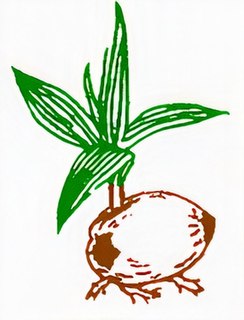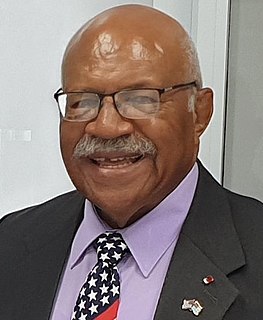
The Fiji Labour Party (FLP), also known as Fiji Labour, is a political party in Fiji. Most of its support is from the Indo-Fijian community, although it is officially multiracial and its first leader was an indigenous Fijian, Dr. Timoci Bavadra. The party has been elected to power twice, with Timoci Bavadra and Mahendra Chaudhry becoming prime minister in 1987 and 1999 respectively. On both occasions, the resulting government was rapidly overthrown by a coup.

The United Fiji Party was a political party in Fiji. It was founded in 2001 by Prime Minister Laisenia Qarase as a power base; it absorbed most of the Christian Democratic Alliance and other conservative groups, and its endorsement by the Great Council of Chiefs (Bose Levu Vakaturaga) caused it to be widely seen as the successor to the Alliance Party, the former ruling party that had dominated Fijian politics from the 1960s to the 1980s. It draws its support mainly from indigenous Fijiians.

Sitiveni Ligamamada Rabuka, OBE, MSD, OStJ, is a Fijian politician best known as the instigator of two military coups in 1987. He was later democratically elected as Prime Minister of Fiji, serving from 1992 to 1999. He went on to serve as Chairman of the Great Council of Chiefs, and later served as Chairman of the Cakaudrove Provincial Council from 2001 to 2008. He was elected to this position on 24 May 2001 and re-elected for another three-year term on 13 April 2005.
Tupeni Lebaivalu Baba is a Fijian academic and politician, who founded the now-defunct New Labour Unity Party. Most members of this party later merged with several other centrist parties to form the Fiji Democratic Party. A former Professor of Education at the University of the South Pacific (USP), he later served as a senior research fellow at the Centre for Pacific Studies at the University of Auckland in New Zealand, from 2001 to the end of 2005. In the general election scheduled for 6–13 May 2006, Baba attempted a political comeback, this time on the ticket of the ruling Soqosoqo Duavata ni Lewenivanua (SDL), a political switch that generated a considerable degree of public discussion. Although his bid was unsuccessful, he was subsequently appointed to the Senate as one of nine nominees of the Fijian government.

General elections were held in Fiji between 10 and 17 July 1982. The paradoxical results were both a triumph and a setback for the Alliance Party of the Prime Minister, Ratu Sir Kamisese Mara. The Alliance captured 51.8 percent of the popular vote, only slightly down on its previous total, but won only 28 seats, 8 fewer than at the previous election of September 1977. Part of the reason for this discrepancy was that the slight surge in support for Ratu Mara's Alliance in the Indo-Fijian community, from 14 percent to 16 percent, was not sufficient to translate into seats in Fiji's communal electoral system, and did not therefore off-set losses among the ethnic Fijian community, particularly in the west of the country. The Western United Front of Ratu Osea Gavidi won only two seats, but split the vote, allowing the National Federation party (NFP), with which it tactically allied itself, to pick up six seats for a total of 22. Moreover, the NFP, which had split into two factions before the previous election, had reunited by now.

General elections were held in Fiji between 4 and 11 April 1987. They marked the first electoral transition of power in Fijian history. Despite receiving just under 50% of the vote, the Alliance Party of longtime Prime Minister, Kamisese Mara was defeated by a coalition of the Fiji Labour Party and National Federation Party, which won 28 seats to the Alliance's 24. The Labour Party's Timoci Bavadra became Prime Minister.

The National Federation Party is a Fijian political party founded by A.D. Patel in November 1968, as a merger of the Federation Party and the National Democratic Party. Though it claimed to represent all Fiji Islanders, it was supported, in practice, almost exclusively by Indo-Fijians whose ancestors had come to Fiji, mostly as indentured labourers, between 1879 and 1916. However, in the 2018 General elections the party recorded a considerable change in its support base as a consequent of the inclusion of more indigenous Fijian candidates.

The National Alliance Party of Fiji (NAPF) was a Fijian political party. It was formally registered on 18 January 2005 by Ratu Epeli Ganilau, as the claimed successor to the defunct Alliance Party, which ruled Fiji from 1967 to 1987 under the leadership of the late Ratu Sir Kamisese Mara, Ganilau's father-in-law. Others involved with the party included university lecturer Meli Waqa as party secretary, and Manu Korovulavula as treasurer. The Deputy Leader was Hirdesh Sharma. The party was launched publicly at a mass rally in Suva on 8 April 2005.

The New Labour Unity Party was a Fijian political party, which broke away from the Fiji Labour Party in May 2001. It was founded by Tupeni Baba, a former Deputy Prime Minister and Labour Party stalwart, who had become dissatisfied with Mahendra Chaudhry's leadership and expressed fears that if Chaudhry, who had been deposed in the Fiji coup of 2000, returned as Prime Minister, there could be another coup. Other prominent Fijians associated with the party included Ratu Meli Vesikula.

The Fijian Association Party (FAP) is a former political party in Fiji. It played a significant role in Fijian politics throughout the 1990s, but lost all of its seats in the House of Representatives in the parliamentary election of 2001.

The Soqosoqo ni Vakavulewa ni Taukei (SVT), occasionally known in English as Fijian Political Party, was a party which dominated politics in the 1990s and was the mainstay of coalition governments from 1992 to 1999.

The Party of National Unity was a Fijian political party founded by Ratu Sairusi Nagagavoka in 1998; by the time of the military coup of 2006, Nagagavoka remained the President of the party. A well-known member of the party was Apisai Tora. Presenting itself as a multiracial party representing the interests of Ba Province in particular, it formed part of the Fiji Labour Party-led People's Coalition in the general election of 1999, and won four seats in the House of Representatives. It lost all of its seats in the following election, in 2001, but party stalwart Ponipate Lesavua was appointed to the Senate as one of 8 nominees of Opposition Leader Mahendra Chaudhry.

The People's Coalition was an alliance of three political parties in Fiji, formed in March 1999 to contest the parliamentary election to be held in May that year. The three parties were the Fiji Labour Party (FLP), led by Mahendra Chaudhry, the Fijian Association Party (FAP), led by Adi Kuini Speed, and the Party of National Unity (PANU), led by Apisai Tora.

The National Democratic Party (NDP) was a Fijian political party formed in the early 1960s through a merger of Apisai Tora's Western Democratic Party with Isikeli Nadalo's Fijian National Party. It drew its support mainly from indigenous Fijians in the Province of Ba and other Western regions, who were uneasy about potential domination by powerful chiefs from Eastern Fiji. It subsequently merged with the Federation Party, which was supported almost entirely by Indo-Fijians, to form the National Federation Party (NFP).

The Justice and Freedom Party (JFP) was a minor political party in Fiji. It was formed in 2000 to promote the interests of the Indo-Fijian community, and unsuccessfully contested the 2001 and 2006 elections. It was dissolved in 2013.

Western United Front (WUF) was an ethnically Fijian political party formed prior to the 1982 elections and contested the election in coalition with the National Federation Party.
The Federation Party was Fiji's first formal political party. The Citizens Federation, which had won three of the four seats reserved for Indo-Fijians at the 1963 elections, decided to formalize its role as a political party, which was officially founded on 21 June 1964 with A. D. Patel as President and Sidiq Koya as Vice-President. The merger took place in time for the party to participate in the 1965 constitutional conference which was called to map out a path towards independence from the United Kingdom. In 1968, the Federation Party merged with the National Democratic Party to form the National Federation Party, which is now (2021) the oldest political party in Fiji still in existence.

The Social Democratic Liberal Party (SODELPA) is a Fijian ethno-nationalist political party. The party was formed in January 2013 after the dissolution of the Soqosoqo Duavata ni Lewenivanua. The party's leader is Viliame Gavoka.
HOPE is a political party in Fiji. The party is led by former National Federation Party president Tupou Draunidalo, and supports multiculturalism, a higher minimum wage, and the de-politicisation of the office of Attorney-General.





